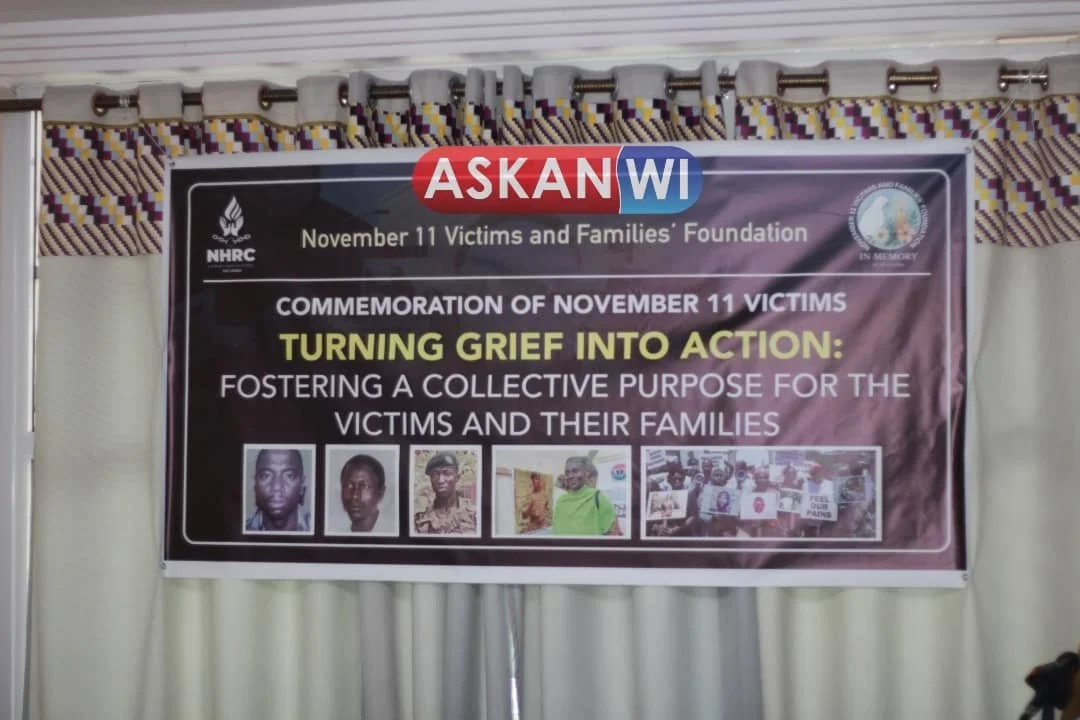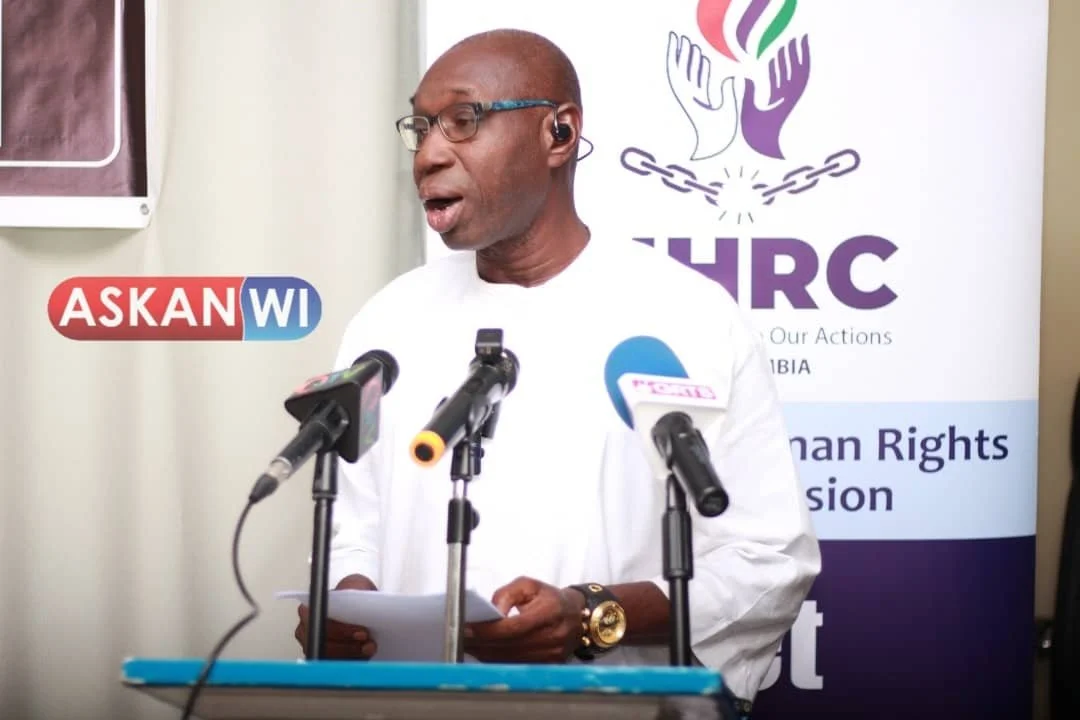Only One TRRC Activity Completed as Victims Commemorate November 11th Massacre
November 11th Victims Banner © Askanwi
By Yusef Taylor, @FlexDan_YT
Today, 11 November 2025, marks 31 years since the execution of at least eleven soldiers of the Gambia National Army, in what one survivor describes as “a calculated purge aimed at consolidating power and eliminating perceived threats to the ruling junta.” This report reviews the government’s progress in implementing key recommendations related to the brutal massacre of soldiers just months after the Armed Forces Provisional Ruling Council (AFPRC) came to power.
Three years on, President Adama Barrow’s government—which promised sweeping reforms—has managed to implement only one activity out of twelve related to Theme 2: November 11 Attempted Coup, while seven activities are ongoing and four remain unimplemented.
The Truth, Reconciliation, and Reparations Commission (TRRC), which investigated human rights violations committed under former President Yahya Jammeh, issued a report that the government has largely accepted for implementation.
Across the entire TRRC, 263 recommendations have been accepted out of 265, with only 16 being reported as completed by the end of May 2024. This year, the NHRC has changed its reporting style to track activities, of which 60 out of 304 have been completed. The NHRC’s latest report revealed that 143 activities are ongoing, while 101 activities have not been implemented.
The TRRC revealed that just months after the AFPRC coup, Capt. Sanna Sabally, Edward Singhatey, Saidou Hydara, Yankuba Touray, and Peter Singhatey—along with their orderlies and some State Guard officers—attacked Yundum and Fajara Barracks on the night of 10 November and the morning of 11 November 1994. They arrested and later executed several alleged coup plotters.
“The Commission found that 11 men, including Lt. Basiru Barrow, Abdoulie Dot Faal, Sergeant Fafa Nyang, and Sergeant E. M. Ceesay, amongst others, were tortured and extra-judicially executed on or about November 11, 1994. GNA soldiers, including Lance Corporal Alagie Kebbeh, Private Abdoulie J. Darboe, and Private Mafugi Sonko, amongst others, were also arrested, unlawfully detained, and tortured. The men who were arrested but not executed were subsequently tried in Court Martials at Fajara Barracks and sentenced to terms of imprisonment.”
Ballo Saidykhan Chairperson of November 11th Victims Group © Askanwi
Speaking at the 31st commemoration, survivor Ballo Saidykhan, Chairperson of the November 11th Victims Group, refuted claims of a coup and described how officers were summarily executed without fair trial or transparent investigation. He raised concern over “the delay in handing over exhumed bodies to families for Muslim burial due to forensic identification that the government still can’t provide.” This underscores the urgency of implementing recommendations that would bring closure to victims and families.
In his emotional speech, Saidykhan—a former security officer who once shared a room with Jammeh—recounted that one of the accused officers, Darboe, who “vehemently denies” any involvement in a coup plot, was forcibly paraded naked before being shot at, surviving only by feigning death amid the chaos. His account highlights the brutality and absence of due process that defined the events of that day.
To implement the TRRC’s recommendations and reinforce the “Never Again” mantra, the government launched an Implementation Plan outlining activities to be completed between 2023 and 2027. One key recommendation calls for “the prosecution of all members of the junta — Yahya Jammeh, Sanna Sabally, Edward Singhatey and Yankuba Touray — and senior military officers who participated in the November 11, 1994, tortures and killings.”
Another recommendation calls for the prosecution of Baboucarr Jatta, Peter Singhatey and Papu Gomez for their alleged roles in the tortures and killings of November 1994.
Relatives of Soldiers Executed © Askanwi
With former President Jammeh recently announcing his planned return to The Gambia in November 2025, the National Human Rights Commission’s (NHRC) latest status report — covering May 2024 to May 2025 — lists this recommendation as “ongoing”.
According to the NHRC, “the process is awaiting the establishment and full functioning of the Special Prosecutor’s Office and the effective implementation of the Special Accountability Mechanism Act 2024.”
The only recommendation marked as “implemented” by the NHRC concerns the development of “a better-trained police and military force with a basic understanding of human rights norms and the state’s international obligations.” To achieve this, the government plans to “mainstream victim-centric strategies as part of the new National Development Plan.”
The report adds:
“The new Recovery-Focused National Development Plan (RF-NDP) 2023–2027 emphasises empowerment, social inclusion and leaving no one behind, specifically targeting women, girls, children, youth, persons with disabilities and older persons to create a more productive and fairer society.”
“This reflects a focus on social inclusion and addressing the needs of vulnerable and marginalised groups, which aligns with victim-centric approaches. The RF-NDP also aims to consolidate gains in democratic governance and social transformation, including strengthening social protection systems and resilience for vulnerable populations affected by shocks and crises.”
However, it remains to be seen whether completed activities actually translate into completed recommendations.
Recently, civil society organisations submitted a Position Paper to the government calling for urgent measures to address police brutality and enhance accountability within security institutions. The paper documents several incidents of police brutality from 2018 to 2025, including the Faraba killings and the deaths of Kebba Secka, Ousman Darboe, and Omar Badjie.
These recurring incidents raise serious questions about the level of implementation of the TRRC recommendations, the government’s commitment to the “Never Again” mantra, and its resolve to hold human rights violators accountable.



